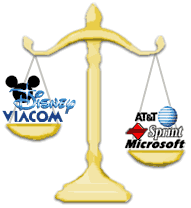|
|
|
Secretary General Kofi Annan has encouraged all UN agencies to The centerpiece of this initiative is his Global Compact, launched with the agencies for environment (UNEP), labor (ILO) and human rights (UNHCHR) in July, 2000. This report argues that corporate influence at the UN is already too great, and that new partnerships are leading down a slippery slope toward the partial privatization and commercialization of the UN system itself. The Secretary General's office and UN agencies such as UNICEF, UNDP, WHO, and UNESCO are partnering with corporations known for human, labor and environmental rights violations. The Global Compact and its cousin partnerships at other UN agencies threaten the mission and integrity of the United Nations. The Global Compact The Global Compact has four major problems: 1.Wrong Companies: The Secretary General has shown poor judgment by allowing known human rights, labor and environmental violators to join. 2.Wrong Relationship: Clearly the UN must have interactions with corporations, as when they procure goods and services or to hold them accountable, but it should not aspire to "partnership." 3.Wrong Image: The UN's positive image is vulnerable to being sullied by corporate criminals, while companies get a chance to "bluewash" their image by wrapping themselves in the flag of the United Nations. 4.No Monitoring or Enforcement: Companies that sign-up get to declare their allegiance to UN principles without making a commitment to follow them. The New Guidelines The new guidelines for UN cooperation with corporations state that companies that violate human rights "are not eligible for partnership." Mr. Annan violated the guidelines just a few days after they were published by inviting Shell to join the Global Compact and its envisaged partnerships. The UN claims that it lacks the capacity to monitor corporations' activities. This creates a Catch-22 situation. Without monitoring capacity the UN will not be able to determine, under its guidelines, if a corporation is complicit in human rights violations. The Guidelines also provide for the limited corporate use of the UN logo. This presents a potential marketing bonanza for companies like Nike. Toward a Corporate Free UN If the Global Compact and other corporate partnerships represent the low-road, then there are four key steps that can be taken to build a high-road. 1.Support the Code of Conduct on transnational corporations and human rights being drafted by the UN Subcomission on Human Rights. 2.Support UN-brokered multilateral environmental and health agreements which can reign in abusive corporate behavior on a global scale. 3.Pressure the US government to pay the UN the money it owes with no strings attached. 4.Support and promote The Citizens Compact, which calls for a legally binding framework for corporate behavior. To read the complete report, please see Corporate Watch... nd to poverty. These foot-soldiers are mobilisi |

